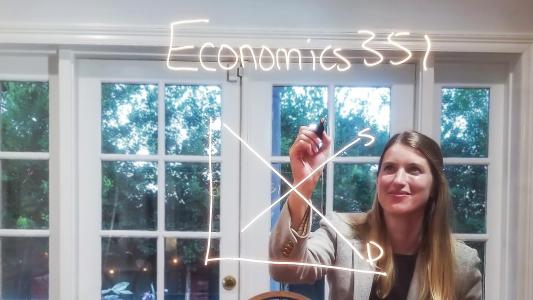This week a new digital education platform emerged to challenge Zoom’s reign as the leading platform for remote instruction.
Engageli launched with a whopping $14.5 million in seed funding, despite being only a few months old. But it is backed by a powerhouse team of entrepreneurs, professors, and ed-tech pioneers: Daphne Koller, a co-founder of Coursera; Dan Avida, co-founder of Decru (a storage security company); Jamie Nacht Farrell, a former executive at 2U and Trilogy; and Serge Plotkin, a Stanford University emeritus professor.
While Zoom has become synonymous with remote learning, it didn’t take long for Avida and his wife Koller to realize that the platform wasn’t engaging high school students. Watching their daughters making the abrupt transition to Zoom classes in March motivated them to look for other options.
“I noticed that they weren’t always fully focused on the teacher or class and were clearly missing the social engagement, so we decided to find and recommend to their school a better tool than the conferencing software that the school was using,” Avida told Inside Higher Ed.
He and his wife surmised that the problem was the video conferencing format. It didn’t engage the students and check in with individuals to keep them learning, reports TechCrunch.
After failing to find a better tool, the duo decided to build their own.
The timing couldn’t be riper for Engageli. Ushered in by the pandemic and quick transition to remote learning, interest in digital education platforms is gaining momentum. While Zoom was built as a web conferencing tool, Engageli is purpose-built for higher education.
At first glance, it looks like most web-conferencing platforms: a gallery view of faces, a la Hollywood Squares; the ability to raise your hand; and a text chat feature. But the team designed Engageli’s new features for the optimal virtual classroom experience. It allows the instructor to host multiple “tables,” where students can have breakout sessions. And students can take notes directly via the platform.
“Each lecture is recorded and can be accessed via the platform or from a link on the instructor’s LMS (learning management system) platform,” Avida told VentureBeat. “Each student’s notes are also saved and synced to the point of the lesson when the notation was taken.”
Engageli also incorporates analytics that measures student engagement, like how often they participate in polls or class discussions. The instructor can make a quick assessment of students’ engagement stats by glancing at a list of their names with colored dots: red for low participation, green for highly engaged.
The team hopes to make Engageli optimal for all types of students. It is browser-based — meaning participants do not need to download an app to join the class. And they reduce the bandwidth by combining the video feeds — facilitating higher participation by students with limited broadband access.
Zoom might be Engageli’s competitor, but — to be fair — Zoom wasn’t designed for college or high school. In fact, none of the standard web-conferencing platforms — Google Meet, Microsoft Teams, and (my favorite) UberConference — were built for the virtual classroom. Instead, teachers are forced to adapt the classroom to fit the web conference platforms (like this teacher’s DIY lightboard hack), whereas Engageli is purpose-built for educational use.
Human connection, interaction and inclusion are critical ingredients for engagement and transformative learning in any classroom and Engageli was built on those fundamentals.
Daphne Koller
Digital-ed platforms and programs are on the rise because the pandemic has spotlighted the need for targeted remote educational tools. Others include Outschool, Unacademy, Google Classroom, or the newly launched ClassEDU, which is an add-on for Zoom. And Zoom’s CEO Eric Yuan just announced a new feature — the ability to interact with other apps, like Dropbox or Slack.
“Zoom is not a meeting anymore, it’s more like a people-centric infrastructure service,” he told Forbes.
Even though they were inspired by their daughters’ high school experience, the Engageli team is launching a pilot program this week with partner universities. Eventually high schools will return to in-person instruction, while colleges will continue to offer at least some of their classes online.
“Human connection, interaction and inclusion are critical ingredients for engagement and transformative learning in any classroom and Engageli was built on those fundamentals,” said Koller in a statement. “The Engageli platform gives students and teachers a place to communicate, exchange ideas, work out problems and learn content at a deeper level.”
We’d love to hear from you! If you have a comment about this article or if you have a tip for a future Freethink story, please email us at [email protected].






